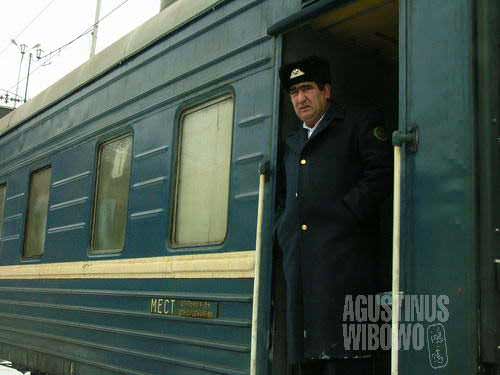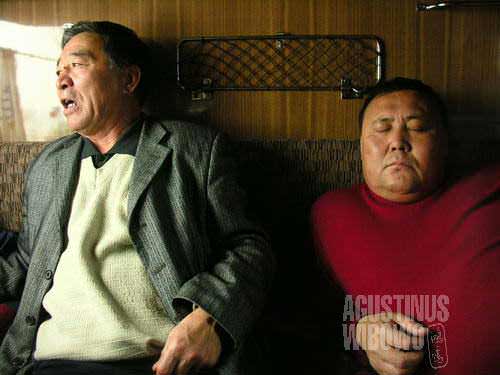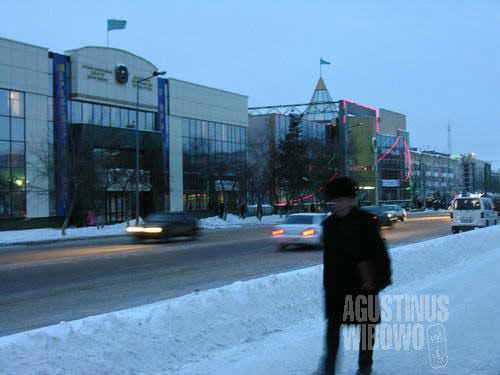Astana – The New Capital
The 20 hour journey on a sleeper bus from Almaty to Astana was flat. From the window I saw the massive, flat land of Kazakhstan. My image of green giant steppe, in cold winter like this, was replaced by thick snow layer. Everything was flat and white. The sky was completely grey, adding the sorrow of traveling in Kazakhstan in freezing cold winter.
But Kazakhstan was inviting. In this 2nd class sleeper, which cost 20 dollar a seat plus 250 Tenge for bed sheet rental (I tried to refuse but the train attendants said she wouldn’t allow me to sleep on the bedding without the sheets), I shared the compartment with two Mongolian Chinese and a Kazakh woman.
The two Chinese men of Mongolian ethnic spoke good Chinese and Russian. They were all from Xinjiang province. One had Kazakh passport and the other, Mr. Ye Shunde, still possessed a Chinese passport.
“It’s now easy to acquire Kazakh passport,” said Mr. Ye, “you just need to marry a Kazakh woman and you get citizenship.” Kazakhstan is a huge country with enormous wealth, but lack of population. The country with land area 50% larger than Indonesia was only inhabited by less than 20 million populations. The Kazakh government, at early years of independence of the new country, encouraged all Kazakh around the globe ‘to return home’ and build the homeland. Kazakhs, mostly live as poor minority in neighboring republics of Uzbekistan, Kyrgyzstan, Mongolia, and China, after saw good prospect and economic boom in their new independent homeland, chose to migrate. This caused enormous migration from the neighboring countries. These Kazakh ethnic were entitled to acquire Kazakhstan citizenship immediately. Those who were educated, at least with university degree, were not only promised citizenship, but also accommodation and financial support.
In their new, rich country, slowly but sure, the Kazakhs enjoyed prosperity. This also invited many minorities living in Xinjiang province of China – the closest, biggest, most populated and desperate neighbor, to migrate as well. Most of them were Uyghur ethnic, which, as Kazakh, spoke Turkic language. There were also Mongolians like Mr. Ye’s friend, as well as Han Chinese, Hui (Dungan), and Chinese Russian. For these non-Kazakh ethnics, the easiest way for citizenship was through marriage with Kazakhstan citizens. Mr. Ye, the fat man in his forties, said it was really tempting, but no matter how good the life was in Kazakhstan compared to Xinjiang, his home was there, in Xinjiang, among green steppes and high lakes of snow-capped mountains (in northern Xinjiang) in Boltala Mongolian Autonomous county. He loved his Mongolian history and culture, and regretted that most Mongolian ethnic in China don’t speak their mother tongue anymore. He spoke some Mongolian sentences which I didn’t understand at all. His accent was very different to Mongolian language I knew in the Republic of Mongolia.
Kazakhstan was enjoying its oil fortune now. Among the Central Asian republics, Kazakhstan might be the luckiest boy to be blessed by the enormous wealth. The average income of the people was very high; some ideas that was like a dream in the Soviet days now might be realized.
One of the ideas was building a new, modern city, in the middle of harsh and friendly steppe.
That city was Astana.
President Nazarbayev moved the capital to Astana in 1997. ‘Astana’ in Kazakh language simply meant ‘capital’. This controversial maneuver was part of his political strategy. Many people thought he was crazy, as the location of Astana is in the heartland of Kazakh steppe, with extreme climates in burning summer and freezing winter. Even in this early winter days temperature in Astana dropped already to -20 degree. Adding to the unfriendly climate, the location of Astana was also problematic. It was in the middle of nowhere, far from everywhere. It was 1300 km from Almaty, the most important city in Kazakhstan. Other cities are far way. It was closer to Russia rather than to Asia.
Russia played important role in the reasoning of the maneuver. Kazakhstan is the only Central Asian republic with unique proportion of the population: the majority ethnic, the Kazakh, only constituted a little bit more than a half (it was even less than half when Kazakhstan acquired its independence). The Kazakh population was like spectrum, from its stronger frequency in the south and getting less northward. The majority towns in northern areas were more Russian than Kazakh. Those areas preferred to join Russia in early years of the new country.
The sudden movement of the president, moving the capital from far south city of Almaty to northern village of Akmola (later, Astana) was effective strategy. The central, the heart of the country, was now in northern part, close to Russia, rather than the far south Almaty which was close to other Asian republics.
I came to Astana with full of fear. The weather worried me a lot, that my host ‘babushka’ in Almaty lend me wool socks and sweaters to handle Astana’s unfriendly winter. The second worry was cost. Even Almaty had caused me to feel as a beggar, and Astana, due to its location and now its role as capital, cost much more expensive than Almaty.
The train station of Astana was quite modern one, with many of its trains were international trains connecting the country to its giant neighbor, Russia. The cheapest accommodation option in Astana was the ‘retirement house’ in the train station. And a bed in 6-bed-room cost more than 10$. Later I had to sleep in the train station, pretending to wait for the departure of the trains, to avoid the high accommodation cost. The police woke me up many times. They didn’t allow homeless to sleep in the station hall. I was one of the homeless, sigh.
I arrived late in Astana. But I had appointment with a Russian friend. I was waiting for him, under unforgiving snow, at Betshibilik park, in front of Sime Tempore Mall. It was dark, scary, and cold. I waited for him for more than 2 hours, and he just simply turned off his mobile phone. At 11 Astana was cold like a hell, a complete death city then. Friendly police in the park tried hard to help me, by lending telephone and calling taxi.
Honestly speaking, my first arrival in Astana was of disappointment of an unfulfilled promise.









Leave a comment